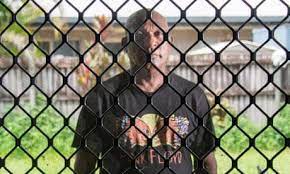The Albanese government has reauthorised offshore immigration detention on Nauru and sought to overturn a court decision that forced it to release about 100 people from onshore detention despite character concerns.
The Nauru authorisation passed parliament on Tuesday with Coalition support despite accusations that Labor had mishandled national security, while the independent senator David Pocock labelled it a massive failure.
The issue exposed crossbench concerns about Labor’s failure to dismantle immigration detention and abolish temporary protection visas (TPVs).
On Tuesday the refugee and writer Behrouz Boochani visited the parliament, calling on Labor to support a Greens push to bring people from offshore detention back to Australia and accusing the Liberal leader, Peter Dutton, of dehumanising asylum seekers.
In December the Australian government lost a case in which the full federal court ruled that aggregate sentences should not trigger automatic visa cancellation under the character provisions of the Migration Act.
Guardian Australia revealed that the decision resulted in about 100 people being released from onshore immigration detention.
On Tuesday afternoon the government introduced a bill in the upper house restoring its previous interpretation that sentences for multiple offences that are aggregated to a term of imprisonment of 12 months or more should trigger mandatory visa cancellation.
The government has already briefed the opposition. The shadow immigration minister, Dan Tehan, got support in shadow cabinet to back the change but has told Guardian Australia the Coalition will also seek to move amendments “to strengthen the character test by providing additional grounds to consider visa cancellation”.
“The Coalition supports a strong approach to ensuring that visa holders that are in Australia uphold the laws of this country and pass a character test to remain here,” he said.
The leader of the house, Tony Burke, began the day by moving to suspend standing orders to pass an instrument redesignating the Republic of Nauru as a regional processing country.
The previous instrument expired on 01 October. Burke said it was a “time-sensitive” matter that needed to be resolved on Tuesday.
“There are real-life consequences if we’re not able to deal with these issues today,” Burke said in a short speech lumping the Nauru instrument in with an unrelated debate about superannuation transparency.
The instrument in effect designates a country as somewhere asylum seekers who arrived in Australia after July 2013 must be taken while their claims are assessed. It is unclear what legal impact the five-month lacuna since the previous instrument expired will have.
The manager of opposition business, Paul Fletcher, agreed that this was a matter of urgency, accusing the government in the house of “absolutely and totally [having] dropped the ball on a matter of national security”.
When the House returned to the question in the afternoon, the home affairs minister, Clare O’Neil, said the fresh authorisation was required to be “strong on borders without being weak on humanity”.
O’Neil said offshore detention “breaks the business model of people smugglers who seek to market an outcome among world’s most vulnerable people” and “saves the lives of thousands”.
The shadow home affairs minister, Karen Andrews, said it was “unusual and extraordinary” the government needed fresh authorisation, adding that it was “deeply concerning” the earlier instrument had been allowed to lapse.
The Greens and independents including Monique Ryan, Kylea Tink and Zoe Daniel called on the government to dismantle offshore detention.
In both House and Senate, the Albanese government and Coalition combined to pass the authorisation, with support in the Senate from One Nation, the Jacqui Lambie Network and the United Australia party.
The Greens opposed both offshore processing and the character test changes.
Pocock told Guardian Australia “the last thing” he wants to see “is a return to failed border policies of the past that cost hundreds of lives”.
“However, at the same time it also makes no sense to be paying $420m of taxpayer money over three years to detain a small group of people.
“We can do better as a country and clearly need a more humane and more efficient way of dealing with refugees in our region, said Pocock.
SOURCE: THE GUARDIAN/ PACNEWS













